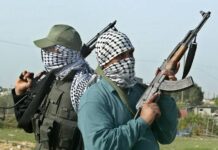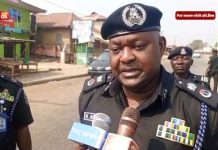
It is the 20th anniversary of the assassination of Nigeria’s former Attorney General of the Federation, Chief Bola Ige. SAN.
Chief Ige was killed on 23rd December, 2001 at age 71 while serving as Nigeria’s Minister of Justice.
20 years after his gruesome murder, the question of who killed the former Governor of old Oyo State has again resurrected. Many Nigerians have called on successive governments to fish out the killers of the Esa-Oke born politician and polyglot but to no avail.
Literature icon, Prof. Wole Soyinka few days ago reminded President Muhammadu Buhari on the need to probe the death of the former minister.
Precision Online Newspaper hereby reproduced a short profile of the late Afenifere leader below:
James Ajibola Idowu Adegoke Ige was born in Esa Oke, Osun State in the South Western part of Nigeria on 13 September 1930. His parents were Yoruba natives of Esa-Oke town, in the old Oyo State (now in Osun State). Ige left Kaduna and headed south to the Western region at the age of 14. He studied at Ibadan Grammar School (1943–48), and then at the University of Ibadan. From there, he went to the University College London, where he graduated with a law degree in 1959. He was called to the bar in London’s Inner Temple in 1961.
Ige established Bola Ige & Co in 1961, and later became a Senior Advocate of Nigeria. He became well known in the country for his oratory prowess, as well as his advocacy work on civil rights and democracy. Ige’s faith was Christianity. Uncommonly, Ige spoke all the three major Nigerian languages, Yoruba, Ibo and Hausa fluently. He wrote several books, and an anthology of articles and tributes about him was published shortly after his death.
Early political career
During the First Republic (1963–66), at the age of 31 he was at the centre of the Action Group crisis, when Chief Obafemi Awolowo was pitted against his deputy, Chief Samuel Ladoke Akintola. He became a rival of Olusola Olaosebikan for succession to Obafemi Awolowo. Ige was a Commissioner for Agriculture in the now-defunct Western Region of Nigeria (1967–70) under the military government of General Yakubu Gowon. In 1967, he became a friend of Olusegun Obasanjo, who was a commander of the army brigade in Ibadan.
In the early 1970s, during the first period of military rule, he devoted his time to the anti-racism campaign of the World Council of Churches.
Towards the end of the 1970s he joined the Unity Party of Nigeria (UPN), the successor to the Action Group. When General Olusegun Obasanjo initiated the Second Republic, he was elected as governor of Oyo State from October 1979 to October 1983. Adebisi Akande, later to be governor of Osun State after it was split off from Oyo State, was his deputy governor during this period. In the 1983 elections, when he ran for re-election as the UPN candidate, he was defeated by Dr. Victor Omololu Olunloyo. Ige unsuccessfully challenged the election in court. However, Olunloyo lost the seat three months later to a coup staged by Generals Muhammadu Buhari and Tunde Idiagbon.
Ige was detained after the coup, accused of enriching himself with party funds. He was released in 1985, after the next coup, by Ibrahim Babangida, and returned to his legal practice and to writing. In 1990, he published People, Politics And Politicians of Nigeria: 1940–1979, a book that he had begun while imprisoned. He was one of the founders of the influential Yoruba pressure group, Afenifere. Although critical of the military rule of General Sani Abacha, Ige avoided political difficulties during this period.
Death
On 23 December 2001, Ige was shot dead at his home in the south-western city of Ibadan. He had been entangled in squabbles within his Alliance for Democracy party in Osun State. The previous week, the long-running feud between Osun state Governor Bisi Akande and his deputy, Iyiola Omisore, had apparently contributed to the death of an Osun State legislator, Odunayo Olagbaju. The government of President Olusegun Obasanjo deployed troops in south-western Nigeria to try to prevent a violent reaction to the murder. Although various people were arrested and tried for involvement in the murder, including Iyiola Omisore, all were acquitted. As of November 2010 the killers had not been found. He was buried in Ibadan. In a speech at his funeral, he was quoted as saying that he was sure that Nigeria was worth living for but he was not so sure that it was worth dying for.















